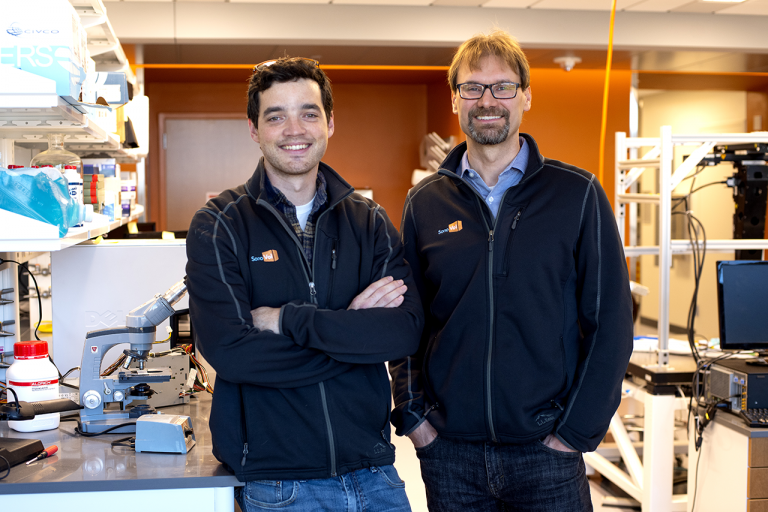UNC-affiliated startup company SonoVol is co-founded by Professor and interim chair of BME Paul Dayton and BME alumni Ryan Gessner, who is CEO of the company. SonoVol is a life science research tools company that operates within the in vivo imaging technology market. The name is a combination of “Sono” (ultrasound) and “Vol” (volumetric, 3D), after technology originally based on 3D ultrasound, although the company has since expanded into additional imaging modalities through funding from the National Science Foundation and National Institutes of Health. The company’s easy-to-use scanning technology allows scientists who are developing drugs and therapies with the potential to cure diseases to spend more time on their science and less time operating imaging equipment.
Their first product, the Vega emerged as the solution to a particular set of problems Prof Dayton and his student Ryan Gessner faced while trying to support cancer researchers with their imaging methods years ago. For example, one of the problems Gessner faced was the time required to perform imaging scans; he used to be able to do about 8 to 12 scans on a very busy day. Today, their Vega customers do about 50 scans in two hours. Prof Dayton adds “If the Vega had existed then, I think I would have been able to publish twice as many papers with our collaborators in the Lineberger Cancer Center.”
As a UNC startup, they worked with staff at Carolina Kickstart to set up all the infrastructure of the company: name, license for the technology from UNC and an advisory board. Carolina Kickstart also helped them secure space in the Genome Science building (GSB) and work through UNC’s Facilities Use Agreement process. Among UNC’s internal resources Prof Dayton and Gessner recommend: the Startup-UNC course (formerly Launching the Venture) at the business school and Kickstart’s University Entrepreneurship Workshop. SonoVol has now secured many different grants from both the NIH and NSF with collaborations in industry and academia. At first, they would limit collaborations with people at UNC, but over time, their network has grown in collaborations with universities across the country: UC San Diego, Johns Hopkins, University of Minnesota, and Duke. For the full article, check Innovate Carolina website here.



